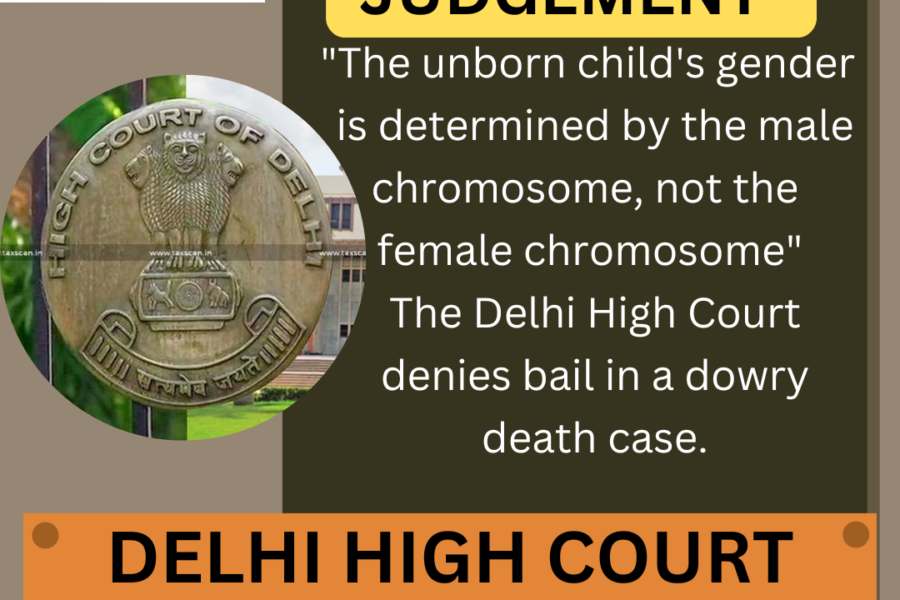Case Title: Hardesh Sharma v. State
BAIL APPLN. 43/2024
The Delhi High Court has emphasised the importance of teaching those who perpetrate harassment against a daughter-in-law over the birth of a female child the genetic science that determines a child’s gender. This is in relation to a landmark ruling in a dowry death case. An application for regular bail was made in a case lodged for offences punishable by Sections 304B, 498A, and 34 of the Penal Code, 1860 (IPC) under Sections 439 read with Section 482 of the Criminal Procedure Code (CrPC). Because the charges have not yet been framed, the material witnesses have not yet been questioned, and the allegations are serious, Swarana Kanta Sharma, J., denies the applicant’s request for bail.
Judge Swarana Kanta Sharma stressed that those who commit these crimes need to understand that their son, not their daughter-in-law, is the one whose chromosomes determine whether a child is born a son or a daughter through marriage.
The Court emphasised the contempt for “genetic science,” explaining that genetic makeup is determined by the pairing of X and Y chromosomes, whereby males have one Y chromosome and females have XX chromosomes.
“Interestingly, genetic science is disregarded in this regard. It states that X and Y chromosome combinations determine the gender of the foetus at conception, with males having one X and one Y chromosome (XY) and females having two X chromosomes (XX).” “The result of fertilisation depends on whether an unfertilized egg fuses with a sperm containing an X or Y chromosome, resulting in the birth of a girl or male, respectively,” the court stated, citing Encyclopaedia Britannica.
Judge Sharma stated that the court had dealt with a lot of cases of dowry deaths or suicides where the victim had been victimised for having daughters after being hounded nonstop for not being able to fulfil her husband and in-laws’ desire of “preserving the family tree.”.
The court highlighted the prevalence of regressive mindsets and instances exemplified by cases involving insatiable dowry demands, framing them as a broader societal concern.
The difficulties married women face were emphasised by Justice Sharma, who also emphasised that a woman’s inherent worth and dignity should not be dependent on her parents’ capacity to pay their in-laws’ outrageous demands.
“Cases involving unquenchable demands for dowry serve as an example of the continued existence of regressive ideas and underline a larger societal challenge. It draws attention to the difficulties married women experience, whose inherent worth and dignity shouldn’t depend on their parents’ capacity to satisfy the unreasonable financial demands of their in-laws.
The notion that a woman’s value is dependent on financial factors, like a dowry, runs counter to modern notions of equality and dignity. The idea that a woman’s worth decreases if her parents are unable to meet her husband’s and her in-laws’ expectations for a dowry is pervasive prejudice and discrimination against women. These demands not only go against the fundamentals of gender equality but also foster an atmosphere in which women are dehumanised and reduced to mere transactions,” the court observed.
The husband’s bail application in a dowry death case was dismissed by the single-judge court when the observations were made.
The father and his family members were accused of abusing their wife to extract a dowry, which ultimately caused her to take her own life. The complainant, who is the deceased woman’s father, claims that the accused and his family caused great pain to his daughter by pressuring her to provide more money and dowry. He further claims that because she had two daughters, she had been harassed and tormented.
According to the court, events such as this one serve as depressing landmarks on the route towards equal societal progression for women in a society that prioritises equality and works towards women’s empowerment and equal progress them.
The court stated, “A conscientious society should find it unacceptable that a woman has lost her life for giving birth to females, prima facie.” Even before the trial starts, these offences must be regarded as terrible and serious.
The court further declared that, despite the seriousness of the current applicant/accused, the charges have not yet been formed and the relevant witnesses have not yet been questioned, so it is not inclined to press charges against them. at this point, increase his bail.
As a result, both the current bail application and any future ones, if any, are dismissed. Additionally, it is made clear that nothing stated above can be interpreted as a judgment on the case’s merits, as the court ruled.
Adv. Khanak Sharma

